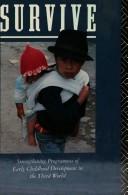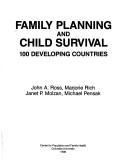| Listing 1 - 4 of 4 |
Sort by
|

ISBN: 0415073073 Year: 1992 Publisher: London New York Routledge in cooperation with UNESCO for the Consultative Group on Early Childhood Care and Development
Abstract | Keywords | Export | Availability | Bookmark
 Loading...
Loading...Choose an application
- Reference Manager
- EndNote
- RefWorks (Direct export to RefWorks)
Book
ISBN: 0821385267 9786612906237 0821385283 1282906232 9781282906235 9780821385289 Year: 2010 Publisher: Washington, DC : World Bank,
Abstract | Keywords | Export | Availability | Bookmark
 Loading...
Loading...Choose an application
- Reference Manager
- EndNote
- RefWorks (Direct export to RefWorks)
The World Bank created this Early Child Development (ECD) Guide in response to a growing demand from Task Team Leaders (TTLs) for advice and support to facilitate the policy dialogue on the topic of ECD and to help policy makers make and implement relevant choices on how to best invest in ECD in the context of their country's economy and national priorities. This Guide fills a gap in the literature by (i) distilling existing information in a user-friendly format, (ii) providing practical information on topics that have recently become particularly relevant in ECD (e.g., measuring child develop
Child development -- Developing countries. --- Child welfare -- Developing countries. --- Early childhood education -- Developing countries. --- Child development --- Child welfare --- Early childhood education --- Social Welfare & Social Work --- Social Sciences --- Child & Youth Development --- Child study --- Children --- Development, Child --- Development --- Education --- Developmental biology --- Developmental psychobiology --- Child rearing

ISBN: 0962095206 9780962095207 Year: 1988 Publisher: New York (N.Y.): Columbia university. Center for population and family health,
Abstract | Keywords | Export | Availability | Bookmark
 Loading...
Loading...Choose an application
- Reference Manager
- EndNote
- RefWorks (Direct export to RefWorks)
Sexology --- Demography --- Developing countries --- Birth control --- Child welfare --- Developing Countries --- Family Planning --- Infant Mortality --- Population Control --- Public policy --- Statistics --- trends --- tables --- -Child welfare --- -Child protective services --- Child protective services personnel --- Children --- CPS (Child protective services) --- Humane societies --- Protection of children --- Family policy --- Public welfare --- Social work with children --- Social work with youth --- Population control --- Pregnancy --- Family planning --- Contraception --- Reproductive rights --- Charities --- Charities, protection, etc. --- Protection --- Prevention --- Statistics. --- -Statistics --- Family Planning Services --- tables. --- Child protective services --- Developing Countries. --- Public Policy. --- Birth control - Developing countries - Statistics --- Child welfare - Developing countries - Statistics
Book
ISBN: 1441962743 1441963375 9786612953446 1489997024 1441962751 1282953443 1552504883 Year: 2010 Publisher: New York ; London : Springer,
Abstract | Keywords | Export | Availability | Bookmark
 Loading...
Loading...Choose an application
- Reference Manager
- EndNote
- RefWorks (Direct export to RefWorks)
What factors affect child welfare? How can policy improve child welfare? In developing countries, there has been relatively little empirical work on the analysis and measurement of child poverty. Further, poverty has many dimensions, including mortality, morbidity, hunger, illiteracy, lack of fixed housing and lack of resources, and cannot be assessed with a single measurement method. Based on original research in Africa and South America, and using a multidimensional poverty indicator approach, this book identifies the existence of inequalities in child welfare, analyzes their sources, and evaluates the impacts of policy responses to those inequalities. Topics considered include monetary poverty, asset poverty, nutrition, mortality, access to education and school attendance, child labor and access to health services. The book’s findings demonstrate that while current government programs offering financial assistance, supplementary food, and free or subsidized education and health care have a positive impact on child welfare, these outcomes can still improve, and proposes policy prescriptions towards this end. The book will be of use to poverty and policy researchers, professionals in international development, and graduate students interested in poverty and inequality.
Child welfare --Developing countries. --- Child welfare --- Social Welfare & Social Work --- Business & Economics --- Social Welfare & Social Work - General --- Economic Theory --- Social Sciences --- Poor children --- Children --- Poverty --- Social conditions. --- Government policy --- Developing countries --- Social policy. --- Public health. --- Community health --- Health services --- Hygiene, Public --- Hygiene, Social --- Public health services --- Public hygiene --- Sanitary affairs --- Social hygiene --- Emerging nations --- Fourth World --- Global South --- LDC's --- Least developed countries --- Less developed countries --- Newly industrialized countries --- Newly industrializing countries --- NICs (Newly industrialized countries) --- Third World --- Underdeveloped areas --- Underdeveloped countries --- Economics. --- Management science. --- International economics. --- Economic policy. --- Development economics. --- Social structure. --- Social inequality. --- Development Economics. --- Economics, general. --- Social Structure, Social Inequality. --- Economic Policy. --- International Economics. --- Destitution --- Wealth --- Basic needs --- Begging --- Poor --- Subsistence economy --- Childhood --- Kids (Children) --- Pedology (Child study) --- Youngsters --- Age groups --- Families --- Life cycle, Human --- Children of the poor --- Economically disadvantaged children --- Economic conditions --- Health --- Human services --- Biosecurity --- Health literacy --- Medicine, Preventive --- National health services --- Sanitation --- Economic policy, Foreign --- Economic relations, Foreign --- Economics, International --- Foreign economic policy --- Foreign economic relations --- Interdependence of nations --- International economic policy --- International economics --- New international economic order --- Economic policy --- International relations --- Economic sanctions --- Economic nationalism --- Economic planning --- National planning --- State planning --- Economics --- Planning --- National security --- Social policy --- Economic theory --- Political economy --- Social sciences --- Economic man --- Economic development --- Egalitarianism --- Inequality --- Social equality --- Social inequality --- Political science --- Sociology --- Democracy --- Liberty --- Organization, Social --- Social organization --- Anthropology --- Social institutions --- Quantitative business analysis --- Management --- Problem solving --- Operations research --- Statistical decision --- Equality.
| Listing 1 - 4 of 4 |
Sort by
|

 Search
Search Feedback
Feedback About UniCat
About UniCat  Help
Help News
News